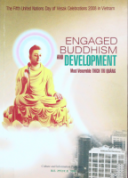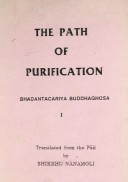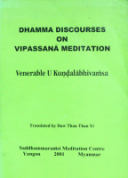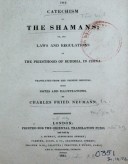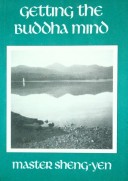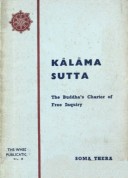Tìm Sách
Sách tiếng Anh-English >> The Buddhist Revival In China
Thông tin tra cứu
- Tên sách : The Buddhist Revival In China
- Tác giả : Holmes Welch
- Dịch giả :
- Ngôn ngữ : Anh
- Số trang : 361
- Nhà xuất bản : Harvard University Press
- Năm xuất bản : 1968
- Phân loại : Sách tiếng Anh-English
- MCB : 1210000002608
- OPAC :
- Tóm tắt :
PREFACE
This is the second in a series of three volumes on Buddhism in modem China. Whereas the first dealt with its system and institutions, this deals with its history, focusing on its rapid evolution in the three decades prior to the Communist victory of 1949. The third volume will take up what has happened (.both institutionally and historically) under the Communist regime.
One problem in producing a series is how much to repeat. Should each volume be independent? Or may the author refer to explanations he has given earlier? As might be expected, I have chosen a middle course. Whatever is essential for understanding has, I hope, been included between these covers; but the reader will often be referred to my Practice of Chinese Buddhism (Harvard University Press, 1967) for amplification and Incidental intelligence. Although the preface of the latter serves the present volume as well, two points bear repetition. First, the following account of the Buddhist revival in China focuses on men, organizations, and events, and deals only incidentally with doctrinal developments and intellectual history. Second, It is not exhaustive. It would have taken more time than was available to me (another two or three years) to complete the exploitation of even the basic source materials—hence the refrain in the notes that “more investigation is needed.” It may also be worth noting that, whereas about a third of the data in the preceding volume came exclusively from interviews, the proportion is somewhat less in the pages that follow; and a larger proportion of such interview data comes from single informants rather than from the collation of interviews with several.
For active assistance in gathering material, reading parts of the manuscript, and suggesting improvements I want to thank Robert N. Bellah, Martin Bernal, Paul A. Cohen, Winston Hsieh, P. Y. Hsing, Sidney Liu, Shigeni Matsumoto, Masatoshi Nagatomi, David Hoy, Vincent C. T. Shui, Ernest Young, Mrs. John Quirk, and Mrs. Noriko Tamada. Mrs. John Mitchell read over the whole manuscript, as she had its predecessor, without being thanked until now. I am particularly indebted to Mr. Zunvak Yue (Yu Ching-yu), who went over each page with expert care and found many errors. The generosity of the Reverend Henry p. King made it possible to include the photographic essay by Henri Cartier-Bresson.
Although during most of the preparation of this volume I was on the staff of the East Asian Research Center at Harvard University, some of the material had been collected during the three previous years, when I was receiving a grant from the Joint Committee on Contemporary China. I take this opportunity to express my gratitude to both institutions.
I owe the greatest debt to the Chinese Buddhist monks and laymen whose kindness to a stranger and whose patience in answering his questions have well exemplified the bodhisattva path they follow.
Mrs. S. C. Chiu has once again proved herself the best typist in the Far East, while my wife is still my favorite editor.
Holmes Welch
Concord, Massachusetts
October 1967
CONTENTS
I. THE BEGINNINGS OF THE REVIVAL
YANG WEN-HUI • MODERN EDUCATION FOR MONKS • REVOLUTIONARY MONKS
II. THE STRUGGLE FOR NATIONAL LEADERSHIP
THE INVASION OF CHIN SHAN • RIVAL BUDDHIST ASSOCIATIONS • THE CHINESE BUDDHIST ASSOCIATION (shanghai, 1929)
III. T’AI-HSU
WORLD ORGANIZATIONS * DOMESTIC ORGANIZATIONS • T’AI-HSU AND SCIENCE • TAI-HSU’S METHODS
IV. THE LAY BUDDHIST MOVEMENT
TYPES OF LAY SOCIETIES • THE RIGHT FAITH SOCIETY • THE GROWING ROLE OF THE LAITY
V. BUILDING AND PUBLISHING
RESTORATION • NEW MONASTERIES • PUBLISHING
VI. BUDDHIST EDUCATION
TRADITIONAL EDUCATION • SEMINARIES: KUAN-TSUNG • T’AI-HSU’S • SEMINARIES • THE T’IEN-NING SEMINARY • THE LEVEL OF EDUCATION • THE METAPHYSICAL INSTITUTE
VII. SOCIAL ACTION BY THE SANGHA
THE LUNG-CH’UAN ORPHANAGE • OTHER WELFARE ACTIVITIES • THE SANGHA’s APPROACH TP SOCIAL WELFARE
VIII. SANGHA AND STATE
REPUBLICAN LAWS AND THEIR ENFORCEMENT • THE LAW VERSUS THE ENEMIES OF BUDDHISM • FRIENDS IN HIGH PLACES • MONKS IN POLITICS
X. FOREIGN CONTACTS
CONTACTS WITH JAPAN • CONTACTS WITH TIBET • CONTACTS WITH THERAVADA BUDDHISTS • CONTACTS WITH CHRISTIANS • CHRISTIAN CONVERTS TO BUDDHISM • CONTACTS WITH CHINESE OVERSEAS
XI. SECTS AND DISSENSION
THE ESOTERIC SCHOOL • THE ANTISECTARIAN TREND • REGIONAL LOYALTIES • DIVISIVE ISSUES
XII. CHRISTIAN STEREOTYPES AND BUDDHIST REALITIES
BUDDHIST REALITIES • THE GROWTH IN UNDERSTANDING • DISTORTING FACTORS • REGIONAL DIFFERENCES
XII. THE MEANING OF THE REVIVAL
WAS IT A REVIVAL?
POSTSCRIPT
APPENDICES
- Buddhist Periodicals
- Buddhist ‘Seminaries
- Monastic Population Figures
- Regional Decay
NOTES
BIBLIOGRAPHY
GLOSSARY INDEX
 Facebook
Facebook
 Google
Google
 Google+
Google+



